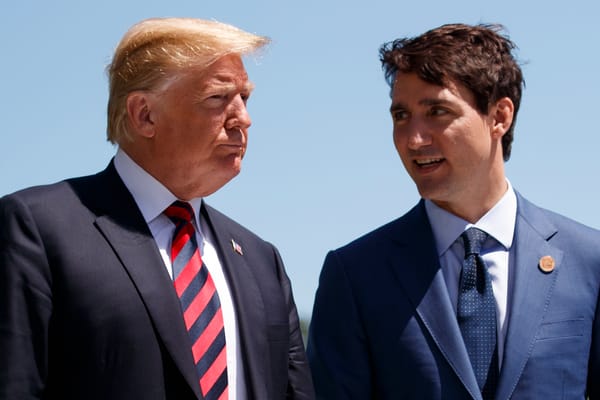Long before Donald Trump announced new tariffs hitting Canada, he had already caused a great deal of consternation for his neighbor to the north. A closer look at what’s happening on the northern side of the longest undefended border in the world shows that Trump, in his distinctive way, is taking advantage of a major weakness. President Trump has been trolling Prime Minister Justin Trudeau and the rest of Canada for weeks with a series of statements that Canada ought to become the 51st state and that Trudeau would make a better governor than a prime minister. He then escalated this rhetoric with a series of press conferences in which he claimed that the Canadian economy was being subsidized by the United States and said that America would no longer accept this bad deal. What explains this adversarial turn?
For many liberal commentators, Canada is not only one of Washington’s closest allies—it is a beacon of democracy and human rights, under the benevolent rule of a leader who has long presented himself as a foil to nasty conservatives, north and south of the border.
“When Trump looks north, he sees something different.”
But when Trump looks north, he sees something different. Beyond the usual concerns about mass migration into the United States, massive fentanyl lab discoveries in British Columbia, and immigrant communities in Canada taking full advantage of the cross-border drug trade, Trump also sees discord among Canada’s provinces, and the Canadian government’s increasing proximity to the Chinese Communist Party.
Tobi Lutke, CEO of the Canadian company Shopify, wrote on X that Trump’s demands on immigration and fentanyl “are not crazy demands, even if they came from an unpopular source.” He also retweeted a post faulting Trudeau for “antagonizing candidate Trump.” Not only has Trudeau needlessly alienated a foreign leader, he has overlooked spreading Chinese influence and disregarded the rights of his own citizens, forfeiting any moral authority.
Despite attempts to conceal the truth from the public, it has been revealed that the CCP has received knowing aid from members of parliament, and assisted 11 candidates in the Toronto area in 2019—most of whom were affiliated with Trudeau’s Liberal Party. Given his party's involvement, it is perhaps unsurprising that Trudeau has failed to get to the bottom of these acts.
If Trudeau has been remiss in countering foreign influence, he has been assiduous in crushing domestic dissent. In January, a judge in Alberta sentenced former Fort Macleod town councilor Marco Van Huigenbos to four months in prison for his role at one of the Freedom Convoy protest sites back in 2022. Van Huigenbos was found guilty of “mischief,” which in Canada is a broad based charge carrying a potential 10-year prison sentence. The mischief of which Van Huigenbos was found guilty amounted to acting as a liaison between protesters in Coutts, Alberta and the police officers who were monitoring the site, an act of diplomacy befitting his position in local political life.
Van Huigenbos is one of three men who were targeted by Crown Prosecutors over allegations that they were the “organizers” of a spontaneously organized and leaderless protest. Despite a lack of evidence, a jury found them guilty, and Van Huigenbos is now behind bars. In another instance of the Trudeau government persecuting peaceful demonstrators, a Canadian TikTok personality named Pat King has recently been convicted of “mischief” over his involvement in the Freedom Convoy protest. King is to be sentenced later this month, and the Crown is seeking 10 years.
Canada would be in a stronger position to protest Trump’s tariffs if it had adequately addressed Chinese interference in its election and refrained from abridging the rights of its citizens. Now, however, Trump should use his leverage to highlight the illiberal and anti-democratic tendencies of Justin Trudeau and his heir apparent, Mark Carney. Part of any plan to lift tariffs should be assurances that Canada will partner with the United States to resist Chinese interference, and that it will respect the free-speech rights of its citizens.
Carney has the audacity to describe himself as a political outsider, despite being the former governor of both the Bank of Canada and the Bank of England and a longtime advisor to Trudeau. He wrote a column encouraging Trudeau’s authoritarian tendencies by supporting an invocation of the Emergencies Act to deal with the largest peaceful protest in the nation’s history.
Trudeau has only himself to blame for Canada’s weak position vis-à-vis the United States. Many Canadians would welcome critical discussions of their present government, especially heading into contests to select a new national leader. But Trudeau, who has had success in suppressing internal dissent, will have a harder time limiting criticism from those outside the country. If Canada’s own citizens are not guaranteed the right to express dissatisfaction with their government, that task may have to fall to Donald Trump.
